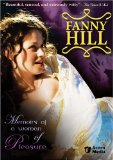| Reviews & Columns |
|
Reviews DVD TV on DVD Blu-ray 4K UHD International DVDs In Theaters Reviews by Studio Video Games Features Collector Series DVDs Easter Egg Database Interviews DVD Talk Radio Feature Articles Columns Anime Talk DVD Savant Horror DVDs The M.O.D. Squad Art House HD Talk Silent DVD
|
DVD Talk Forum |
|
|
| Resources |
|
DVD Price Search Customer Service #'s RCE Info Links |
|
Columns
|
|
|
Fanny Hill (2007)
Acorn Media has released the 2007 BBC Four adaptation of Fanny Hill, the 18th century John Cleland pseudo-memoir that is generally regarded as the first erotic novel of Western literature. Adapted by the "inventive" Andrew Davies (Brideshead Revisited) and directed by James Hawes (who helmed the excellent The Chatterley Affair, which I reviewed here), Fanny Hill ultimately comes off as a charmless, cold thing, hampered by an utterly confused approach to its diffused themes (is there morality in purely sexual pleasure? Do we accommodate our morality based on our circumstances?), as well as by its surprisingly muffed approached to its eroticism.
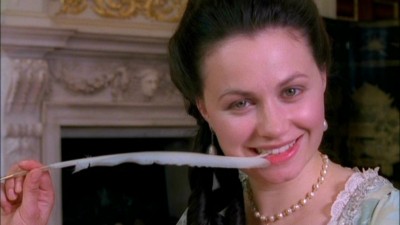
Framed as a remembrance by the older but wiser Fanny (Rebecca Night), Fanny Hill begins with recently orphaned, unbelievably naive Northern country girl Fanny Hill "rescued" from poverty by her childhood friend Esther (Emma Stansfield). Streetwise Esther hooks the sweetly dense Fanny into paying both their way to London, where Esther pimps Fanny out to Mrs. Brown (Alison Steadman), a seemingly kind-hearted lady of "good standing," whom Esther tells Fanny is looking for domestic help. What Fanny takes seemingly forever to find out is that Mrs. Brown is in fact a madame, and her fine town house is brothel. After being initiated into the pleasures of Venus by fleshy, good-natured Phoebe (Carli Norris), Fanny still can't quite figure out how things work around Mrs. Brown's place - either mechanically or monetarily.
The first is taken care of by giggling whores Susan (Louisa Clein) and Emma (Joanna Miller), who let Fanny spy on Mrs. Brown servicing her well-endowed boyfriend. By some magical happenstance, Fanny, who supposedly grew up on a farm, never witnessed such couplings between animals, nor did she understand what happened to her when Mrs. Brown auctioned off her "maidenhead" to Mr. Crofts (Philip Jackson), where Mr. Crofts tried to rape an uncomprehending Fanny before he "missed his mark," so to speak. As for the money angle, Fanny finally figures that out via Phoebe, who eventually tells her about how sex equals money at Mrs. Browns (out of bemused exasperation at Fanny's cement-head ignorance), as well as by the mysterious stranger Mr. H (Hugo Speer), who wishes to clue in a clueless Fanny further, but wisely decides against it. A chance meeting, however, with young, blonde, handsome Charles Standing (Alex Robertson), who happens to be visiting Mrs. Brown's whorehouse, turns Fanny's world upside down.
Impulsively running off with Charles, she finds true love - as well as a painful then pleasurable introduction to sex with a man - when she shares a room with the tender Charles. However, Fanny's fantasy world of constant sex, shopping, and more sex comes to a grinding halt when Charles makes the mistake of asking Fanny to be his wife, whereby he must take her home to meet his father. Naturally, Charles' father turns out to be "Mr. Crofts," and mysteriously, Charles disappears from Fanny's life. Left destitute, and carrying Charles' baby, who or what will Fanny turn to, to survive?
SPOILERS ALERT!
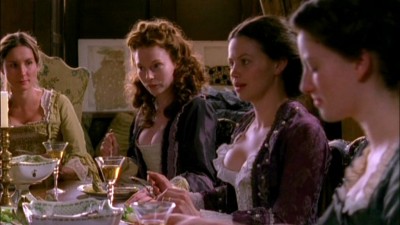
Right off the bat; I've never read Fanny Hill (although I did read Erica Jong's take on it, Fanny, years and years ago), so I can't discuss this TV version in relation to the Cleland novel - which is usually the best way to go with these film adaptations, anyway. The film is, and should be, a separate aesthetic experience from the novel. As well, screenwriter Andrew Davies is noted (or is it notorious?) for at times significantly changing around the classics he adapts, so I would be surprised if Fanny Hill was entirely faithful to Cleland's Fanny Hill. What I've often heard about Fanny Hill is of course the controversy over its pornographic content and the resulting censorship battles that plagued the novel's publication for some 200 years after it was written. Having read only excerpts of the novel (flowery porn, to be sure), I can't judge its literary worth, but I can say that while the TV adaptation does contain nudity and some simulated, R-rated sex scenes, they're nothing compared to the deliciously enthusiastic, graphic prose of Cleland's - a prurient note that should be taken when considering this TV version's intent.
While it may seem juvenile to tick off the level of nudity and sex in Fanny Hill as one might check off a laundry list, such a note-taking does become pertinent because Fanny Hill's intent seems rather confused, when one actually takes the time to search for it among the many bare bottoms and heaving breasts. Is it nothing more than a funny, sexy, "bawdy romp," as some of the actors involved think it is (there are bonus interviews with the cast and crew discussing the production, included on this DVD), or is it a stealth morality play, as suggested by the screenwriter? And what is the validity of that moral that Davies is peddling here? Well...your guess is as good as mine, because after watching Fanny Hill, I wasn't sure if any of them knew what the film was ultimately trying to achieve.
When first watching Fanny Hill, one might assume it's a re-imagined feminist comedy, with Fanny's sexploits set up as some kind of comment on empowerment through sex (and women's exploitation at the hands of men), as filtered through the ironic eyepiece of 21st century Western civilization, looking back at backwards 18th century England. Certainly Fanny's early scene with Esther plays this way, as Esther gives it back to a gentleman who, overhearing Esther's suggestion to Fanny to get a nice gentleman to "take care of her," prompts the gentleman to say that virtue shouldn't be acted out with the expectation of material reward (to which Esther snaps back that perhaps they should just give up their sex willingly for nothing?). But soon, the uglier aspects of Fanny's true plight become apparent, and we wonder where the "fun" is coming from (everyone seems to be laughing in this film, for no apparent reason), while we try to figure out the film's conflicted politics.
The film walks an unsteady line between fluffy sex comedy and morality tale because it seems to want to have its cake and eat it, too. If there's truly no moral to the story (Fanny is constantly telling us that sex is pleasurable in and of itself - for women, too - outside of any morality, while upbraiding the audience in her asides, as if we made judgments already), then the film should be only about the sex and fun and the comedy and the eroticism - all of which seemed strained here. The filmmakers are deliberately coy with the sex scenes (despite the director's insistence in one of the interviews that they didn't muck about with being shy with Cleland's intent), which are often framed voyeuristically through window frames and archways and doorways which, along with murky lighting, help obscure everything that would give the film an "X" rating. Worse, the scenes simply aren't erotic enough to give the film a "charge" of its own, outside of any consideration of any supposed "higher purpose" of politics or morality (a big surprise from director Hawes, who did wonders with the highly erotic The Chatterley Affair). Newcomer Night, who has the burden of playing Fanny from absolute country dunderhead to accomplished, high-priced whore, can't seem to convey either realistic innocence (which she equates with appearing mentally challenged, with gorping mouth and grotesquely rolling eyes every time she sees or hears something dirty), or heated passion (she writhes convincingly, but the sex scenes are so perfunctory - and shot like so much bad soft-core porn - that we have a hard enough time seeing where all the naughty bits go, let alone any emotion, or thought, or intent, in the characters' interactions).
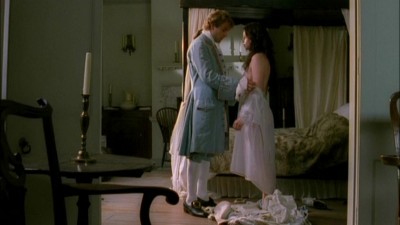
And if the film can't cut it and just be an erotic romp, then it has to have a little bit about something; it has to be a little bit about the morality of Fanny's exploits - and they're nothing to laugh at if they can't be screened out by good sex scenes and genuinely funny moments. All the early Mrs. Brown brothel scenes are played for laughs, but it's hard not to notice that Fanny is being exploited and tricked into becoming a prostitute here, while nearly being raped by Mr. Crofts. Those are tough themes to make "funny" for an audience (if that's even possible in the first place), but clearly Davies and Hawes aren't up to the challenge. Indeed, so much of Fanny Hill is clearly designed to come over as naughty or rompy or bawdy or even slapstick, but almost all of it comes across as distressingly flat and curiously cold-hearted in its calculation. One might say that's the point of the story - a commentary on the calculation of men's exploitation of women - which would be fine, if everyone involved in Fanny Hill would quit saying they're making a funny, erotic comedy that may or may not have any point to it at all.
Fanny's asides to the audience are particularly annoying signposts that the filmmakers may not have had a clear idea what they were shooting for here. Every time a potentially challenging moral dilemma comes up, the storytelling Fanny returns to either accuse us of some unsaid, assumed prejudice, or to give a generalized assumption that we the viewers all feel the same way, and that we would do the same thing Fanny did in the same circumstances. When Phoebe first masturbates Fanny, the narrator Fanny breaks in and accuses us of judging their behavior. The film's assumption, though, is narrow: she's accusing us of judging their sexuality, when it's the immorality of what Phoebe is doing - "turning out" Fanny so she can eventually sell her body for money - that distresses us. The film's curious attitude towards sexual exploitation is further illustrated by storyteller Fanny's frequent excuses for her exploiters' behavior (they were "kind" and "nice" is her refrain), while putting equal blame on herself (laughing at her naiveté) for the trials and tribulations she suffers.
And yet, Davies really can't escape his own conflicted view of vice versus virtue, even though he tries to end the film on an even-steven note (Fanny smiles her way through, "Virtue is preferable to vice, but we can't always choose, can we?" before winking at the camera as she goes off to her now perfect life with Charles and a boat-load of money). While that sentiment is expressed often in Fanny Hill (elsewhere, Fanny intones, "Our virtues and our vices depend too much on our circumstances."), the wrong-headedness of that creed (actually, it's precisely our decisions to try and maintain our inherent morality, despite the direness of our circumstances, that ultimately make our lives worthwhile), is never questioned - even though Davies constantly (and nonsensically, from his own standpoint) undercuts it with protestations of Fanny questioning her supposedly non-judgmental behavior. Throughout the film, there are moments where Fanny questions what her life is, or will be, as a whore, while she laments the loss of her true love, Charles (the Mr. H. interlude perhaps was meant to seal the deal on the notion that sex without love is ultimately counterproductive...even though, typically, Davies has Fanny saying she loved it). Once Fanny is finally, utterly degraded as a street whore, does she understand that all of her sexual dealings in the whorehouses and with Mr. H. - despite the physical pleasure she derived from them - were all the same: devaluing (she says as much in her narration, after being raped by a man in the street). So, apparently, Fanny learned that sex without love is not empowering, and that true happiness can only be found in the arms of her husband, Charles. But how does that relatively conservative thought jibe with much of the film's intent to show Fanny as a liberated woman, in full possession of her body (and most threateningly supposedly, to males, of her own sexuality)? And how does that theme jibe with Davies' stated feeling (through Fanny) that we're powerless to maintain our virtue if our circumstances are dire? And how does that belief jibe with Fanny Hill's dominant theme that sex should be guiltless, regardless of origin? I'll tell you how all that mishmash jibes: it doesn't. And that's why Fanny Hill is such a conflicted, convoluted mess.
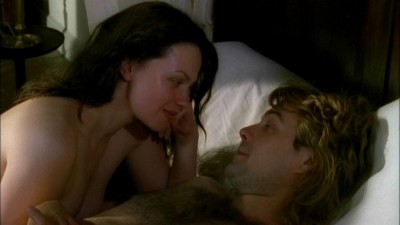
The DVD:
The Video:
Even though this BBC4 production was shot on a severely limited budget and shooting schedule (BBC4 has only a fraction of the budget that the more widely seen BBC1 has), Fanny Hill does look rather pretty here in an anamorphic, 1.78:1 widescreen transfer. I saw no interlacing or jiggering that can sometimes crop up with overseas transfers, while the colors were vibrant and correctly valued. The picture was sharpish, with a bright level of fine detail. A very good-looking piece.
The Audio:
The Dolby Digital English 2.0 stereo track is adequately mixed, with dialogue rendered crisply, while little or no separation effects occur. English subtitles are included, as well.
The Extras:
A series of bonus interviews, which can be broken up into separate sections but which really play as one longer featurette, are included here. Running for a total of 34:37, these interviews with the cast and crew of Fanny Hill do absolutely nothing to clear up any questions one might have as to what, exactly, Fanny Hill is all about, since there seems to be a neat split down the center between those who think the piece is nothing more than a romp, and those who think it has "something to say."
Final Thoughts:
Conflicted, convoluted, and contradictory in intent and execution, Fanny Hill doesn't know what the hell it's about. Is it about empowering women through free, guiltless, and powerful sexuality? Or is it about the morality (or lack thereof) of free, guiltless, powerful sexuality? Or is it all, ultimately, about the humping? Who knows. Rebecca Night can't get a handle on her character - and that's crucial to the film working - but it's probably not this newcomer's fault (look to the screenwriter and director here, with this rushed, ill-thought-out production). I suppose if you're a fanatic for all things Britishy and period-piecey (I know I am), a rental will do. But that's all.
Paul Mavis is an internationally published film and television historian, a member of the Online Film Critics Society, and the author of The Espionage Filmography.


|
| Popular Reviews |
| Sponsored Links |
|
|
| Sponsored Links |
|
|
| Release List | Reviews | Shop | Newsletter | Forum | DVD Giveaways | Blu-Ray | Advertise |
|
Copyright 2024 DVDTalk.com All Rights Reserved. Legal Info, Privacy Policy, Terms of Use,
Manage Preferences,
Your Privacy Choices | |||||||









